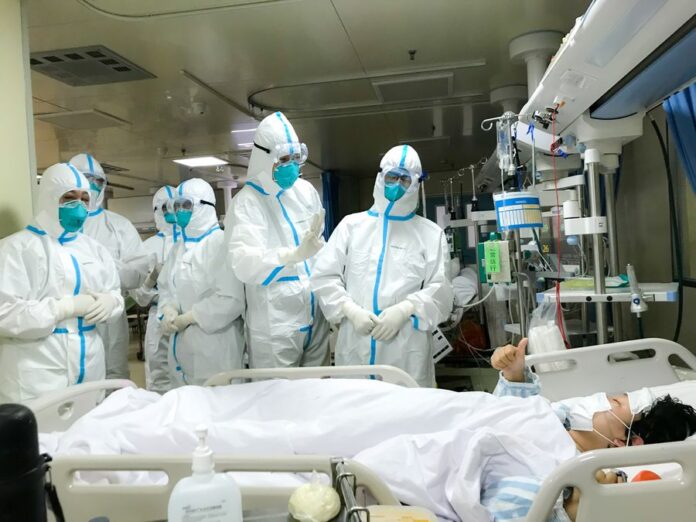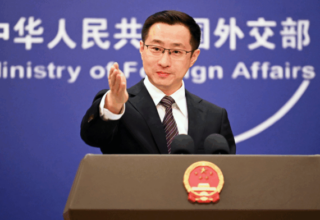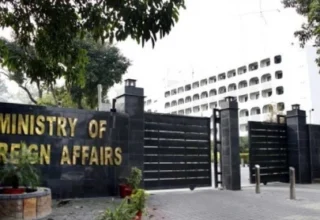
- 300,000 medical masks, 800 hazmat suits, 6,800 pairs of gloves arrive Beijing from Islamabad
ISLAMABAD – While China is struggling to meet the growing demands of medical masks and related medical equipment to help fight the novel Coronavirus, Pakistani government has sent its first consignment of aid to China to facilitate the Chinese government’s fight against deadly novel Coronavirus.
“Pakistani government has allocated 300,000 medical masks, 800 hazmat suits and 6,800 pairs of gloves from the stocks of public hospitals around the nation and transported the aid to China. The medical supplies from Pakistan arrived in China on Saturday afternoon,” said Mr Cui Jun while talking to Pakistan Today from Beijing.
He said that since China needed assistance and Pakistan, which is working to expand exports, can increase the productivity of medical protective equipment and allow China to import.
“Both iron-brothers would benefit together from this trade,” maintained Mr Cui Jun.
Spokesperson of China’s ministry of foreign affairs also made a comment about aid received from Pakistan.
“To help China fight against #nCoV, Russia, Pakistan, ROK, Belarus, France, Germany, Malaysia and UNICEF and many others are providing assistance and support to China. Thanks to you all! A friend in need is a friend indeed,” tweeted the spokesperson.

The Chinese health authorities announced Saturday that 11,791 confirmed cases of novel coronavirus had been reported in 31 provincial-level regions and the Xinjiang Production and Construction Corps by the end of Friday. A total of 259 people have died of the disease, reported China Economic Net.
The ongoing efforts to contain the spread of the novel coronavirus (2019-nCoV) have ramped up in the Chinese scientific community, with researchers racing against time to formulate a detailed profile of the virus and screen treatments.
On Thursday, the Chinese Academy of Sciences (CAS) announced it would provide Chinese researchers with open and free access to the China Science and Technology Cloud (CSTC) in 2019-nCoV research.
The CSTC draws data from the academy’s research institutes and major scientific installations, as well as many of China’s top universities and private innovation centers.
According to the CAS, Chinese researchers in virus transmission and detection, as well as drug and vaccine development, will have free access to all CSTC resources and services, such as high-performance computing, software and video web conferencing for up to 100 people.
Also on Thursday, Baidu Research opened its RNA structure algorithm LinearFold to gene testing agencies, epidemic control centers and research institutions around the world.
The 2019-nCoV belongs to a group of enveloped, single-stranded RNA viruses. The three-dimensional structure of the virus is critical to its stability and function.

Scientists from Baidu Research said the LinearFold algorithm can shorten the time for predicting the secondary structure of the 2019-nCoV from 55 minutes to 27 seconds, speeding up the process of understanding the virus and screening compounds to treat the disease.
Sun Xuejun, a researcher from the Second Military Medical University, said that a major strategy to develop a new antiviral drug is to look for inhibitors for virus replication.
The search can be carried out through testing the current broad-spectrum antiviral drugs and screening possible therapeutic compounds in databases.
On Sunday, researchers from Shanghai Tech University revealed the high-resolution crystal structure of the viral main proteinase, which controls the activities of the 2019-nCoV replication complex and is taken as a potential target for therapy.
The researchers screened marketed drugs as well as databases for high potency compounds and for compounds from medicinal plants. A total of 30 candidates were selected, 12 of which are anti-HIV drugs.
On Wednesday, Shenzhen health officials announced that the city has launched clinical trials for the anti-HIV drug Aluvia and broad-spectrum antiviral drug Favipiravir, to test their effects on the 2019-nCoV.
Sun also pointed out that another approach could be blocking the receptor on the host cell surface.
Previous studies found that ACE2 is a type of enzyme receptor for the SARS coronavirus (SARS-CoV). It is expressed in the outer layer tissue of human airways and functional tissue in the lungs.
Earlier this month, Chinese researchers found that the ACE2 receptor also plays a key role in the 2019-nCoV’s interaction with human cells.
Targeting the ACE2 receptor, researchers from Peking University said they have selected several candidates for treating the 2019-nCoV by screening 2,674 medicines in the market and 1,500 herbal extracts.
Ammonia bromine, known as Mucosolvan, a respiratory lubrication phlegm medicine that is commonly used in acute and chronic bronchitis, is among the selected candidates. The researchers said they planned to start testing the candidate medicines at molecular levels as soon as possible.








